Rusty Python
Rust, a new language for our programmer tool belt
Matteo Bertini
@naufraghi
PyCon Otto | 6-9 April 2017 | Florence


Rust
- Born as a personal project started in 2006 by Mozilla employee Graydon Hoare
- Mozilla began sponsoring the project in 2009 and announced it in 2010
- A young language, with a growing usage in production (Dropbox, Mozilla, Canonical, OVH, ...)
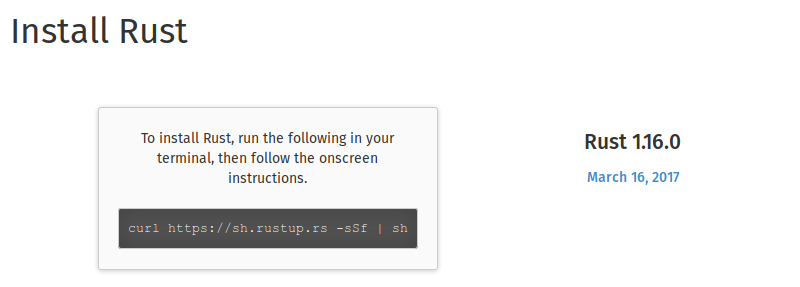

$ cargo new hello-world --bin
Created binary (application) `hello-world` project
$ cd hello-world/
$ tree
.
├── Cargo.toml
└── src
└── main.rs
1 directory, 2 files
Hello, World!
install the Rust toolchain with `rustup`
Hello, World!
fn main() {
println!("Hello, World!");
}huhu? `println!`?
How we run it?
`cargo run`
$ cargo run
Compiling hello-world v0.1.0 (file:///home/naufraghi/.../hello-world)
Finished dev [unoptimized + debuginfo] target(s) in 0.41 secs
Running `target/debug/hello-world`
Hello world!Docstrings?
//! Programma di esempio per _PyCon Otto_,
//! l'immancabile «Hello, World!».
fn main() {
println!("Hello, World!");
}`cargo doc --open`
Integrated docs

Cool, but in Python have `doctest`, I can't live without it!
And Rust "borrowed" the idea!
//! Libreria di esempio per _PyCon Otto_,
//! l'immancabile «Hello, World!».
//!
//! ```
//! use hello_world_lib::greater;
//! let message = greater("World");
//! assert_eq!(message, "Hello, World!");
//! ```
pub fn greater(name: &str) -> String {
format!("Hello, {}!", name)
}in fact a lot of ideas from Python
Run `cargo test --doc`
$ cargo test --doc
Finished dev [unoptimized + debuginfo] target(s) in 0.0 secs
Doc-tests hello-world-lib
running 1 test
test greater_0 ... ok
test result: ok. 1 passed; 0 failed; 0 ignored; 0 measured
Let me see that code again...
pub fn greater(name: &str) -> String {
format!("Hello, {}!", name)
}Where is the `return`?
It's implicit, the last expression is returned
... beware of forgetting some `return` in Python after a switch :)
Optional arguments
pub fn greater2(optional_name: Option<&str>) -> String {
//! Restituisce un saluto di default se il nome è None
//!
//! ```
//! use hello_world_lib::greater2;
//! let message = greater2(None);
//! assert_eq!(message, "Hello, World!");
//!
//! let message = greater2(Some("Matteo"));
//! assert_eq!(message, "Hello, Matteo!");
//! ```
let name = match optional_name {
Some(name) => name,
None => "World",
};
format!("Hello, {}!", name)
}no default values... yet
`if` and `match`are expressions in Rust
Managing None
var = some_optional_value()
if var is not None:
res = do_something_with(var)
else:
res = Noneres = if let Some(var) = some_optional_value() {
Some(do_something_with(var))
} else {
None
}Python
Rust
`None` is a serious thing
fn main() {
let out = if let Some(value) = some_optional_value("some") {
do_something_with(value)
} else {
None
};
println!("out: {:?}", out);
}Nice error messages
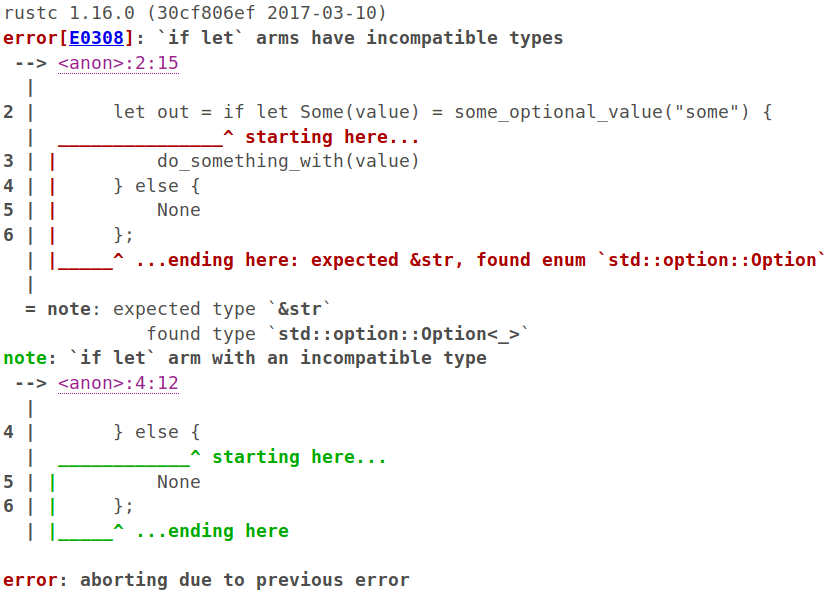
Rust Playground
In Rust we have other ways
some_optional_value().map(do_something_with)pub enum Option<T> {
None,
Some(T),
}`Option::map` will not call `do_something_with` if the value is `None`
`Option` docs
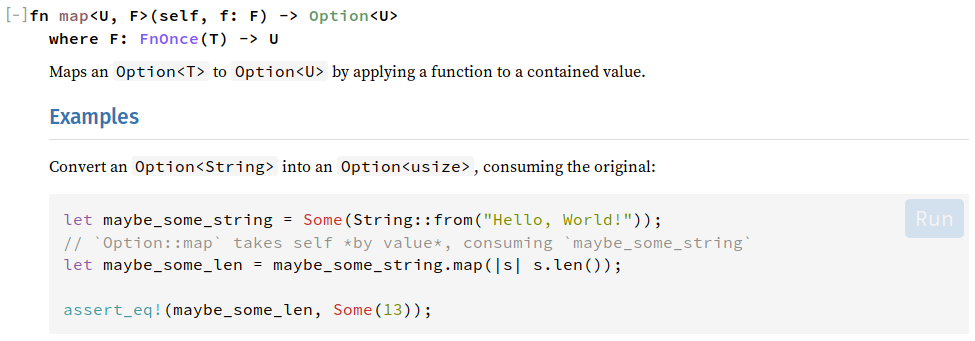
Methods
struct Circle {
x: f64,
y: f64,
radius: f64,
}
impl Circle {
fn area(&self) -> f64 {
std::f64::consts::PI * (self.radius * self.radius)
}
}self | &self | &mut selfTraits
struct Circle {
x: f64,
y: f64,
radius: f64,
}
trait HasArea {
fn area(&self) -> f64;
}
impl HasArea for Circle {
fn area(&self) -> f64 {
std::f64::consts::PI * (self.radius * self.radius)
}
}this is what your lib users will need to implement
Duck typing
def print_area(shape) {
print("This shape has an area of {}".format(shape.area()));
}Traits are something we can use where in Python we were using duck typing
fn print_area<T: HasArea>(shape: T) {
println!("This shape has an area of {}", shape.area());
}Python
Rust
Implementing Traits
struct Counter {
count: usize,
}
impl Counter {
fn new() -> Counter {
Counter { count: 0 }
}
}
impl Iterator for Counter {
type Item = usize;
fn nxt(&mut self) -> Option<Self::Item> {
self.count += 1;
Some(self.count)
}
}Traits are somewhat similar to the `collections.abc` in Python
class Counter(abc.Iterator):
def __init__(self):
self.count = 0
def __nxt__(self):
self.count += 1
return self.count
with a typo in both
Implementing Traits
error[E0407]: method `nxt` is not a member of trait `Iterator`
--> <anon>:11:5
|
11 | fn nxt(&mut self) -> Option<Self::Item> {
| _____^ starting here...
12 | | self.count += 1;
13 | | Some(self.count)
14 | | }
| |_____^ ...ending here: not a member of trait `Iterator`
error[E0046]: not all trait items implemented, missing: `next`
--> <anon>:9:1
|
9 | impl Iterator for Counter {
| _^ starting here...
10 | | type Item = usize;
11 | | fn nxt(&mut self) -> Option<Self::Item> {
12 | | self.count += 1;
13 | | Some(self.count)
14 | | }
15 | | }
| |_^ ...ending here: missing `next` in implementation
|
= note: `next` from trait: `fn(&mut Self) ->
std::option::Option<<Self as std::iter::Iterator>::Item>`
>>> c = Counter()
Traceback (most recent call last):
File "<ipython-input-29-f3cf168481b9>", line 1, in <module>
c = Counter()
TypeError: Can't instantiate abstract class Counter with abstract
methods __next__Runtime check
Compile time check
We have barely seen Rust as a language
- Rust is not easy,
- there are a lot of concepts,
- one can learn step-by-step.
- The tooling is good
- The docs are good
- Let's use Rust!
Ownership
Lifetimes
Mutability
Macros
Pattern Matching
Let's rewrite Electric Sheep

Fly down!
Paper on http://flam3.com/flame_draves.pdf, 41 pages
/ a b \ / x \ / e \
f(x,y) = | | · | | + | |
\ c d / \ y / \ f /
Given 4 linear function with some magic parameters (a,b,c,d,e,f)
Choose a random starting point, say (0,0)
Loop:
- pick a random function
-
apply the func on the last point
-
collect the result
Iterated Function System
Barnsley fern
Iterated Function System

Plot the histogram
Take one at random and collect the points
Python
for i in range(iterations):
f = np.random.choice(arange(4), p=weights)
if f == 0:
P = F1 * P + F1c
elif f == 1:
P = F2 * P + F2c
elif f == 2:
P = F3 * P + F3c
else:
P = F4 * P + F4c
if i > pointsToSkip:
drawPoints[frame][i-pointsToSkip] = squeeze(asarray(P))Rust
for i in 0..iterations + 1 {
let f = wc.ind_sample(&mut rng);
if f == 1 {
p = f1 * p + f1c;
} else if f == 2 {
p = f2 * p + f2c;
} else if f == 3 {
p = f3 * p + f3c;
} else {
p = f4 * p + f4c;
}
if i > points_to_skip {
points.push((p.x, p.y));
}
}How does it work?
Build the extension
$ python setup.py develop
running develop
running egg_info
writing top-level names to ifs.egg-info/top_level.txt
writing dependency_links to ifs.egg-info/dependency_links.txt
writing ifs.egg-info/PKG-INFO
reading manifest file 'ifs.egg-info/SOURCES.txt'
writing manifest file 'ifs.egg-info/SOURCES.txt'
running build_ext
running build_rust
cargo rustc --lib --manifest-path Cargo.toml \
--features cpython/extension-module cpython/python3-sys \
--release -- --crate-type cdylib
Finished release [optimized] target(s) in 0.0 secs
Creating /home/naufraghi/.../python3.5/site-packages/ifs.egg-link (link to .)
ifs 1.0 is already the active version in easy-install.pth
Installed /home/naufraghi/Documents/src/rusty-python-pyconotto/barnsley-fern
Processing dependencies for ifs==1.0
Finished processing dependencies for ifs==1.0Generating the fern
$ python fern.py
Using Python
Frame 0 generated
...
Frame 11 generated
Fern data generation completed in 23.3s
Rendered frame 0000
...
Rendered frame 0011
Converting to animated gif...
Gif Generated

Generating the fern
$ python fern.py rust
Using Rust
Frame 0 generated
...
Frame 11 generated
Fern data generation completed in 0.4s
Rendered frame 0000
...
Rendered frame 0011
Converting to animated gif...
Gif Generated

Generating the fern
$ python fern.py rust
Using Rust
Frame 0 generated
...
Frame 11 generated
Fern data generation completed in 3.3s
Rendered frame 0000
...
Rendered frame 0011
Converting to animated gif...
Gif Generated

- image size 300 -> 600
- iterations 50000 -> 500000


Python wrapper
use cpython::{PyResult, Python};
use barnsley_fern;
py_module_initializer!(_iterated_function_systems,
_inititerated_function_systems,
PyInit__iterated_function_systems,
|py, m| {
try!(m.add(py, "__doc__", "Rust iterated function systems"));
try!(m.add(py,
"barnsley_fern",
py_fn!(py,
py_barnsley_fern(iterations: usize,
points_to_skip: usize,
bending: f64))));
Ok(())
});
fn py_barnsley_fern(py: Python,
iterations: usize,
points_to_skip: usize,
bending: f64)
-> PyResult<Vec<(f64, f64)>> {
Ok(barnsley_fern(iterations, points_to_skip, bending))
}
Python wrapper
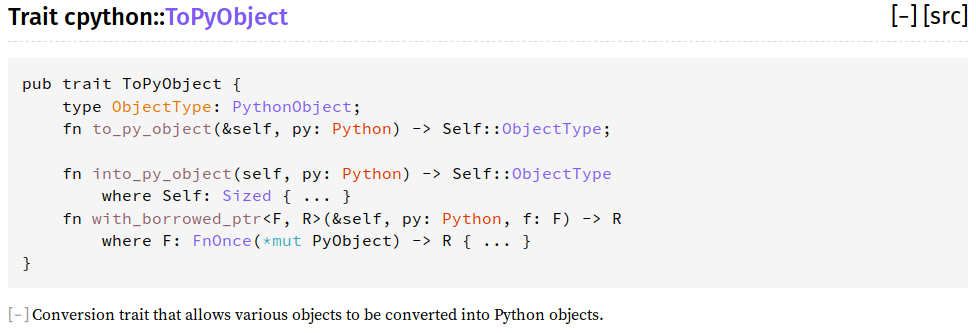
rust-cpython has an impl for most builtin types
setup.py
Cargo.toml
from setuptools import setup
from setuptools_rust import RustExtension
setup(name='ifs',
version='1.0',
rust_extensions=[
RustExtension('ifs._iterated_function_systems',
'Cargo.toml', debug=False)],
packages=['ifs'],
# rust extensions are not zip safe, just like C-extensions.
zip_safe=False)
[package]
name = "ifs"
version = "0.1.0"
authors = ["Matteo Bertini <matteo@naufraghi.net>"]
[lib]
name = "iterated_function_systems"
crate-type = ["cdylib"]
[dependencies]
nalgebra = "0.11.2"
rand = "0.3.15"
cpython = "0.1"CI up and running
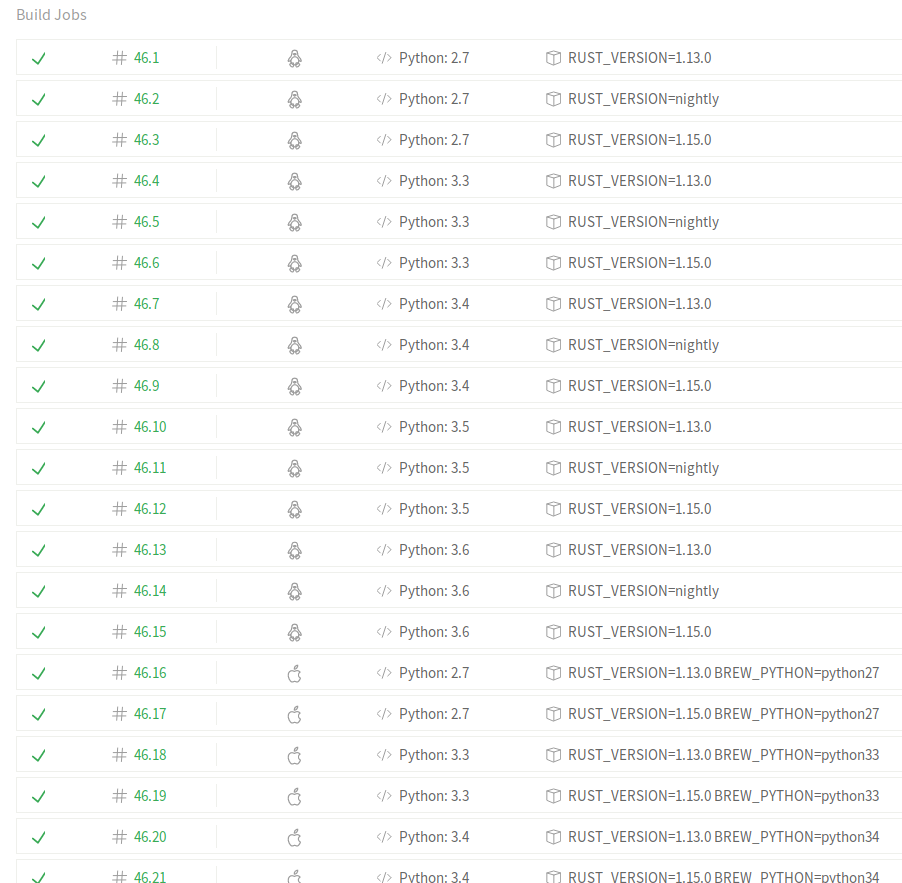
[tox]
envlist = py27, py35
[testenv]
commands =
python setup.py install
pip install example/
py.test
deps =
pytestmatrix:
allow_failures:
os: osx
include:
- language: generic
os: osx
python: 2.7
env:
- RUST_VERSION=stable
- language: python
python: 2.7
env:
- RUST_VERSION=stable
...
# Manually install python on osx
before_install:
- if [[ $TRAVIS_OS_NAME == 'osx' ]]; then ci/osx-install.sh; fi
install:
- curl https://sh.rustup.rs -sSf | sh -s -- -y --default-toolchain $RUST_VERSION
- export PATH="$HOME/.cargo/bin:$PATH"
- rustc -V
script:
- sudo pip install tox
- toxTake away
- Rust seems to be here to stay
- Rust is high level enough
- Integrating Rust in Python is easy
- We can write fast and safe Rust extensions!


Thanks!
Questions?
Other choices
- Cython
- C: CPython / ffi
- c++: SIP (PyQt)
- c++: pybind11 (modern boost::python)
- fortran: f2py
- Rust: CPython / ffi
Resources
- https://www.rust-lang.org/
- https://play.rust-lang.org/
- https://doc.rust-lang.org/book/
- https://github.com/dgrunwald/rust-cpython
- https://github.com/fafhrd91/setuptools-rust
- http://flam3.com/flame_draves.pdf
- https://github.com/marceloramires/FractalRendering
Rusty Python | PyCon Otto | 6-9 Aprile 2017
By Matteo Bertini
Rusty Python | PyCon Otto | 6-9 Aprile 2017
Rust, a new language for our programmer tool belt
- 311
